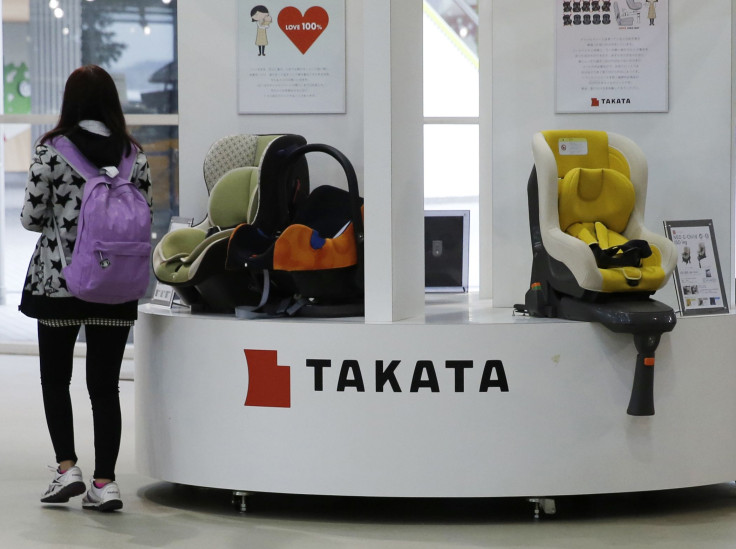Takata Air Bag Quality Control Chief Grilled Over Initial Limited US Recall

The head of quality control at Takata Corp., the Japanese company that made millions of potentially lethal air bag kits for cars, declined Thursday to say he agreed with a recent decision by U.S. regulators to expand recalls to all affected vehicles nationwide.
Previously the recalls had largely been limited to high-humidity regions like Florida and Gulf Coast states where Takata says moisture can cause the bags to inflate with explosive force.
During the Senate Commerce Committee hearing on the handling of the current recalls of at least 7.8 million U.S. vehicles, Sen. Edward Markey, D-Mass., asked Hiroshi Shimizu, Takata’s senior vice president of global quality assurance, if he agreed with the decision Tuesday by the U.S. National Highway Traffic Safety Administration to expand its recall of driver-side airbags from regional to nationwide.
“It’s hard for me to answer ‘yes’ or ‘no’,” Shimizu replied.
“I’m going to take that as a ‘no,’” said Markey.
Earlier in the hearing, Shimizu said Takata still believes affected vehicles in areas of high humidity should be the main focus right now.
“Our best current information supports the view that these regions must be the priority for the replacement of the suspect inflators,” he told the senators. “It’s imperative that all owners of affected vehicles in these regions respond to the legal [recall] notices at the earliest opportunity.”
Takata believes hot and humid atmospheric conditions can lead eventually to moisture contamination of the ammonium nitrate-based propellant, leading air bags to deploy with such explosive force that shrapnel from the system can rip through the bags and into the faces of drivers. Lawmakers grilled Shimizu on various fronts, including asking why passenger-side air bag kits haven’t been included. They also questioned why defective kits should be allowed to linger in cars simply because they’re in parts of the country with lower temperatures and humidity.
Senators pointed to Charlene Weaver, 24, who died in a Takata air bag-related incident while riding as a passenger in a 2004 Subaru Impreza in Arizona, a state with very low humidity. Senators said Weaver may be the sixth confirmed death related to the faulty air bag kits. So far four deaths in the U.S. and one in Malaysia have been linked to the problem.
“It’s clear there has been a history of calculated activity that attempted to balance addressing these airbag defects while avoiding bad publicity and legal liability,” Karl Brauer, senior analyst at automotive pricing and information provider Kelley Blue Book, said in an email. “Unfortunately, this approach delayed a full understanding and awareness of the problem, and likely caused increased risk of death and injury.”
Takata says it’s now making 300,000 replacement kits a month. The company is working to expand that capacity to 450,000 kits a month from its northern Mexico factory where the air bag inflator component is made.
Shimizu spoke after Air Force First Lt. Stephanie Erdman, who came out recently to share her experience with the lawmakers and the auto industry executives that attended Thursday’s hearing.
“When the impact occurred, shrapnel from the car’s air bag shot through the air bag cloth and embedded into my right eye and cheek,” she told the room. “I was instantly blinded on my right side. I felt gushing blood running down my neck. I was terrified.”
At the hospital, a CT scan revealed that a metal fragment from the Takata air bag casing was embedded in Erdman’s nasal bone, centimeters from her eyeball. Erdman has endured multiple surgeries and therapies and she has not regained full vision to her right eye. Had the air bag not inflicted the injury, Erdman would have emerged from the accident with minor abrasions.
She took her 2002 Honda Civic to a dealership for servicing three times between 2010 and her accident. She was never informed of the problem, she said.
“These companies should have done everything they could. They claim that they notified customers as soon as they found out about the problem, that they expanded the recalls as they learned about each set of additional potentially affected vehicles as soon as they could,” she said after pausing to compose herself.
“I believe that the facts show differently,” she added.
The recalls began six years ago with 3,940 vehicles. Because the NHTSA allowed automakers to issue regional recalls, some cars with defective air bag systems weren’t included in past recalls, or “service campaigns.”
© Copyright IBTimes 2024. All rights reserved.






















